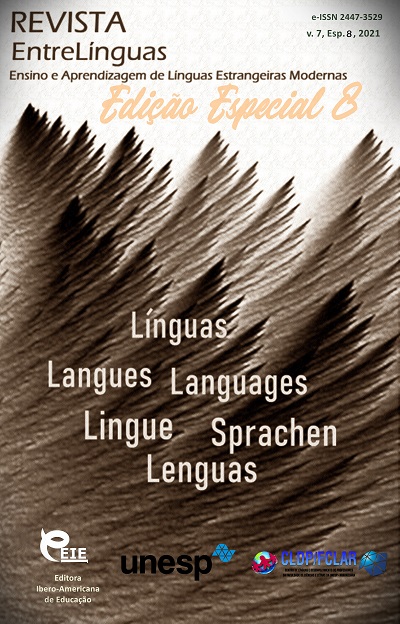Saving of the language as cultural heritage as the sphere of IRCICA's international activity
DOI:
https://doi.org/10.29051/el.v7iesp.8.16341Keywords:
IRCICA, Cultural heritage, Language, CommunicationAbstract
Language not only performs as a method of functional communication but also displays the speaker’s cultural identity and the cultural heritage produced by all former users of that language. The study's main aim is to analyze the activities of the Research Center for the study of Islamic History, Art and Culture (IRCICA) of the Organization of Islamic Cooperation (OIC) on the saving of the historical and cultural heritage of the Tatar people, predominantly language. The main objective of the study implies the presentation of the experience and practical steps of this organization aimed at preserving the cultural heritage of the Tatar people, including language. The methods utilized in this study involve systematization, analysis of specific situations and description of them, comparison as well as concluding. The study’s results demonstrate the importance of such organizations for the scientific world and their role in society.
Downloads
References
Akiş, T. (2020). Emigration Chests in Ankara, Turkey: Tracing Spatial Trajectories of Tatar Community. Space and Culture, 1206331219894247.
Berger, M. (2010). Religion and Islam in contemporary international relations". URL: https://www.clingendael.org/sites/default/ files/pdfs/20100400_cdsp_book_mberger.pdf.
Brooke, J.H., & Numbers, R.L. (2011). Science and religion around the world. Oxford University Press, 338 p.
Chumarova, L. G., Vinnikova, M. N., Fakhrutdinova, A. V., & Yudintseva, A. F. (2019). Theological and educational ideas of the Tatar enlightener Kayum Nasyri. Humanities & Social Sciences Reviews, 7(6), 89-92. https://doi.org/10.18510/hssr.2019.7619
Erkinovna, Y. K. (2020). Crımean-Tatar Peoples Movement In Uzbekıstan In The 80s Of The 20th Century. Journal of Critical Reviews, 7(3), 469-474. https://doi.org/10.31838/jcr.07.03.86
Fakhrutdinov, R. (2018). Riza Fakhretdin: reformator, historian and politician”, Realnoevremya, URL: https://realnoevremya.ru/ articles/96898-riza-fahretdin-v-istorii-tatarskogo- prosvetitelstva.
Gabidullina, F., Galiullin, R., Khakimova, I., & Mansurov, I. (2020). Elitist Education: Historical Experience of the Russian and Tatar Peoples. Journal of Social Studies Education Research, 11(1), 267-280.
https://doi.org/10.1177/1206331219894247
Spivak, D. (2009). Christianity and Islam in the context of contemporary culture: perspectives of interfaith dialogue from Russia and the Middle East. URL: https://unesdoc.unesco. org/ark:/48223/pf0000185275.
Stepanova, E. (2020). Karelian Cultural Heritage in Finland's Folklife Sphere. Western Folklore, 79(4), 377-399.
Sugár, V., Talamon, A., Horkai, A., & Kita, M. (2020). Energy saving retrofit in a heritage district: The case of the Budapest. Journal of Building Engineering, 27, 100982. https://doi.org/10.1016/j.jobe.2019.100982
Downloads
Published
How to Cite
Issue
Section
License

This work is licensed under a Creative Commons Attribution-NonCommercial-ShareAlike 4.0 International License.
Os manuscritos aceitos e publicados são de propriedade da Revista EntreLínguas. Os artigos publicados e as referências citadas na Revista EntreLínguas são de inteira responsabilidade de seus autores.
Transferência de direitos autorais – autorização para publicação
Caso o artigo submetido seja aprovado para publicação, já fica acordado que o(s) autor(es) autoriza(m) a UNESP a reproduzi-lo e publicá-lo na EntreLínguas, entendendo-se os termos “reprodução” e “publicação” conforme definição respectivamente dos incisos VI e I do artigo 5° da Lei 9610/98. O artigo poderá ser acessado pela rede mundial de computadores (Internet), sendo permitidas, a título gratuito, a consulta e a reprodução de exemplar do artigo para uso próprio de quem a consulta, desde que haja a citação ao texto consultado. Essa autorização de publicação 328 EntreLínguas, Araraquara, v. 1, n .2, p. 323-328, jul./dez. 2015 não tem limitação de tempo, ficando a UNESP responsável pela manutenção da identificação do(s) autor(es) do artigo. Os artigos publicados e as referências citadas na Revista EntreLínguas são de inteira responsabilidade de seus autores.











